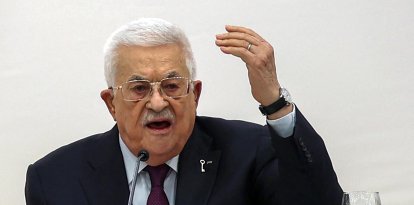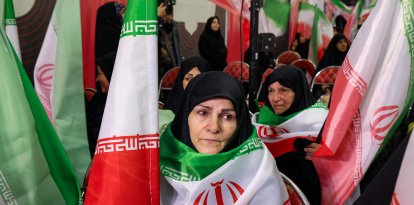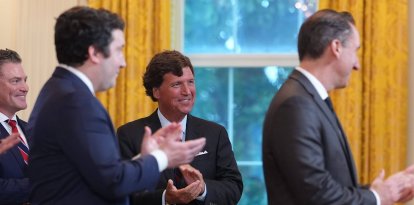Trump's volatile unpredictability: A danger to Israel?
Is Trump willing to sacrifice Israel's security for the sake of a diplomatic victory? Could the pressure to "close the deal" be driving him to consider concessions because of his anxiety to leave an indelible mark on the Middle East?

Trump and Netanyahu
The foreign policy of Donald Trump during his first term was distinguished by one solid linchpin: his firm backing of Israel. The Abraham Accords represented an undeniable strategic success, strengthening crucial regional alliances to counter Iran's influence and weakening the theocratic regime through a "maximum pressure" sanctions policy that left it in a precarious position. Trump demonstrated clear vision by recognizing the Obama nuclear deal as a serious mistake, which not only allowed uranium enrichment, but also injected financial resources into the Revolutionary Guard Corps, facilitating support for its proxies such as Hamas and Hezbollah. The "maximum pressure" strategy came close to destabilizing the Iranian regime.
Unfortunately, under Biden, the illusion of "normalization" with Iran resurfaced. His administration exerted pressure on Israel in the midst of the Gaza war, going so far as to oppose the entry of the Israel Defense Forces (IDF) into Rafah. Consequently, Trump's return generated expectations of a renewed push for the Abraham Accords and a resolute stance towards Iran, especially after the events of Oct. 7 and the unprecedented Iranian direct attack against Israeli territory. But more than 100 days of his administration have passed, and his actions outline a worryingly erratic line with respect to both Iran and Israel, reminiscent of what is happening with Ukraine.
Back and forth from the White House
The multi-purpose and ubiquitous special envoy Steve Witkoff is leading the negotiations with Iran, although at times he does not seem to understand that his mission is not to allow any uranium enrichment. The suggestion to accept a 3.67% limit reproduces the central error of the 2015 agreement. This was fully understood by Secretary of State Marco Rubio, who argued that no enrichment should be allowed. Trump himself was categorical in stating that if Iran persists in developing a nuclear weapon, the situation would be "very sad" and that the United States would have no choice but to prevent it. But at another time, when asked whether Iran could maintain a civilian enrichment program, his answer was ambiguous, stating that he had not made a decision on the matter.
At the same time, an event set off all the alarm bells: the announcement of the truce with the Houthis, tailored only to U.S. interests. Trump announced a ceasefire, arguing that the Houthis did not want to fight, an improbable capitulation that speaks loudly of a certain naiveté, at least, of the president in understanding these hostile actors. Of course the Houthi drones remain active, and the Department of Defense itself has expressed skepticism that the group will abandon its attacks. In addition, the Houthis have stepped up their attacks against Israel. This cessation of air strikes against Yemen, announced without even informing Israel, is alarming.
To add to the confusion, there are journalistic reports suggesting that Witkoff is manipulating the families of the hostages to put pressure on Prime Minister Benjamin Netanyahu. These versions also claim that Trump's negotiations with Saudi Arabia for a civilian nuclear program without demanding as a condition a peace agreement with Israel are solid. This turn represents a radical shift that undermines the possibility of normalization between Jerusalem and Riyadh. While such a deal would face serious difficulties in the Senate, the pressure on Netanyahu is real and growing.
Recent actions by the Trump administration, such as direct negotiations between Adam Boehler and Hamas on the release of American hostages behind the back of the Israeli government, and Trump's "invitation" to Netanyahu to announce the start of talks between Steve Witkoff and the Iranian foreign minister have generated deep concern in Jerusalem. These mixed messages from Washington suggest a president anxious to reach an agreement that avoids direct military intervention in Iran at all costs.
Concern and uncertainty in Israel
Trump's impending trip to Saudi Arabia, seeking arms deals, technological alliances and investment promises, excluding Israel, a direct target of Iranian theocratic hatred, is symptomatic. While a visit to Jerusalem has been delegated to Defense Secretary Pete Hegseth, Israel's absence from the main tour is disturbing. The summit coincides with a new round of negotiations with Iran, making it difficult to keep the latter out of the spotlight.
The Iranian regime has stepped up its willingness to negotiate with the Trump administration, trying to project an image of genuine or harmless intentions. However, no one doubts that behind this willingness lies the regime's desperation to survive and continue its expansionist terror agenda. Its primary objective is having its sanctions lifted and buying time to secretly move forward with its nuclear program and wait for Trump or his successor to have a sufficiently isolationist agenda to allow it to achieve its goals in the region. Too much is at stake if these failed strategies are adopted.
It is crucial to remember that the root of the regional conflict lies in Tehran. But since its founding in 1979, the Islamic Republic has never been as weakened as it is now. Israeli military action has inflicted significant damage on it, and it is enduring a moment of great vulnerability. Added to this is the setback of its regional allies, declining oil revenue and a national economy on the verge of collapse, with an unsustainable cost of living and growing social discontent that opens the real possibility of a national uprising. For Tehran, an agreement with the West is nothing more than a lifeline to alleviate economic pressure, contain domestic unrest, gain international political legitimacy and deal a psychological blow to those inside and outside the country who consider the regime illegitimate.
The Islamic Republic, which has been oppressing its people since the coup d'état that put it in power, embodies a strategy based on the pursuit of nuclear weapons, a growing arms race, the sponsorship of proxy terrorist allies and foreign militias. The actions of Iranian intelligence among its diaspora in the West only confirm the danger that the regime represents on a global scale. In the heart of Tehran, in the so-called Palestine Square, the digital clock counting down the days, hours and minutes remaining until the "destruction of Israel," set by the Iranian regime for the year 2040, is an official, visible, public and permanent declaration of intentions. It is a monument to the yearning for annihilation.
That clock sums up in numbers what the Iranian theocracy has been shouting in words and actions since 1979: that Israel and the United States are existential enemies, the "Little Devil" and the "Big Devil." The hatred has been carefully cultivated, systematically taught, and strategically deployed as a tool of internal cohesion. Trump should not lose sight of this detail.
While it cannot be claimed that Trump is abandoning Israel, the confused and erratic handling of his administration generates concern and uncertainty. In this context, it is imperative for Israel to focus on concluding the war in Gaza in case the outlook changes negatively for the small Jewish nation. For example, the proposal to establish diplomatic relations in exchange for "meaningful concessions" for the Palestinians seems to reverse the logic of the campaign and the early days of the Trump II administration, in which he promised hell if the hostages were not returned.
Is Trump willing to sacrifice Israel's security for the sake of a diplomatic victory? Is his need to rack up international achievements making him vulnerable to the mirages of a Nobel Peace Prize? The pressure to "close the deal" could be driving him to consider concessions because of his anxiety to leave an indelible mark on the Middle East.
Trump: Remember lessons from the past
The naiveté on the horizon portends potential disaster. Giving in to the idea of a Palestinian state as the price for normalization with Saudi Arabia would mean opening the door to a failed, naturally corrupt entity, another jihadist sanctuary that denies Israel's right to exist. It would be handing Iran, Hamas and their allies a free geopolitical advantage and granting them legitimacy.
While Hamas continues to receive support from Tehran, Israel faces pressure to escalate or contain the conflict. The summit in Riyadh stands as an attempt to project power and contain a potential escalation. Tensions are escalating, and Trump faces a crucial dilemma: how to build a new regional order without his moves weakening Israel and strengthening the Iranian regime.
Trump should remember that his greatest foreign achievement lies in understanding that peace in the Middle East is not built by rewarding terrorism. But his desperation for results could lead him to listen too carefully to illusory promises of stability and recognition, not realizing that these siren songs lead him to strategic surrender disguised as cunning.


























